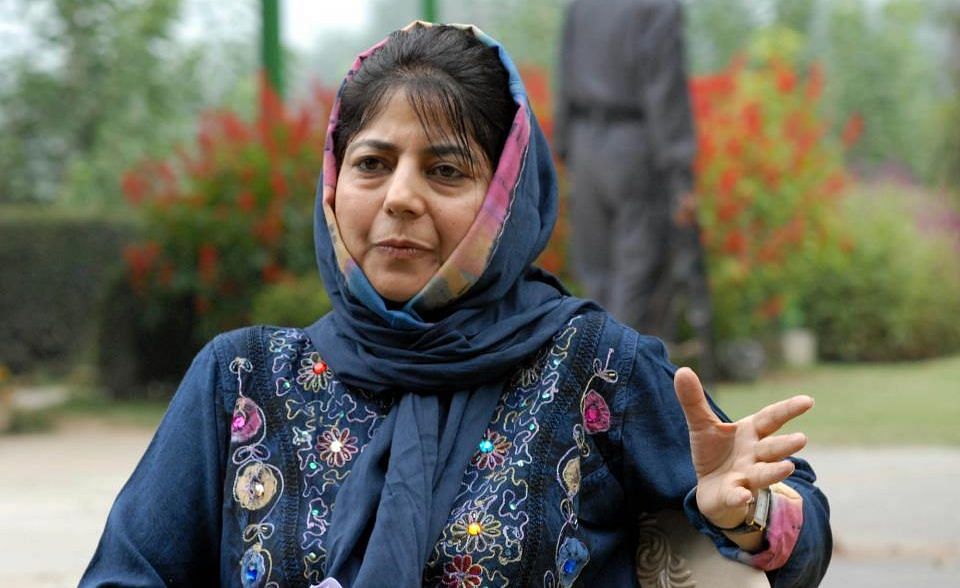Kashmiri leaders should not be targeted just because of their advocacy for dialogue with Pakistan.
Mehbooba Mufti, Chief Minister of J&K, in the Assembly on February 12, expressed anguish at the attitude of some TV Channels, who would dub her call for dialogue with Pakistan to end the bloodshed on the border and inside the state, as anti-national. She mentioned in the same breath that similar allegations would be levelled against leaders of National Conference whenever they said so.
Both National Conference and Peoples Democratic Party have stood with the Indian union and the government in all the difficult times in Kashmir. They have lost a lot of their leaders and cadres to the bullets of terrorists and damage to properties. Then, why do mainstream political leaders from the Valley have to prove their nationalist credentials again and again to be scrutinised by a bunch of media channels and their carefully chosen panelists? One TV channel had even pasted the prefix of “pro-Pak” before the name of present Chief Minister of the State.
This is what the Pakistani establishment and separatists want. Do these channels realize that they are damaging India’s cause in Kashmir by such reporting? They are hitting at the roots of the democratic tree, which we work hard to ensure blossoms fully in the state. If the mainstream parties are the marginalized, then who else will carry our flag in Kashmir? We must know that separatists are waiting in the wings to exploit such situations to their favour. Many a times in the past, they have asked these leaders to join hands with them rather than begging before Delhi.
But none of this is new. It has been happening since 1947. Democratic leaders have been undermined by the Indian union many times. Sheikh Abdullah, the tallest Kashmiri leader, was the first victim. He was implicated in the ‘Kashmir conspiracy’ case in 1958 for advocating the cause of independence, which had to be finally withdrawn, because it was not heading anywhere. It was no different for his son, Farooq Abdullah. He was removed from the post of Chief Minister in 1984 through dubious means, despite having majority. Now, again we are witnessing the incessant targeting of the present Chief Minster. These instances have eroded the credibility of our pro-India leadership, questioned our democratic credentials and strengthened the narrative created by Pakistan.
Of the five soldiers killed in the attack on Sunjwan Army camp in Jammu on February 9-10, four of them hailed from the Valley. Kashmiri Muslims in the Indian Army have fought valiantly for the nation by giving the ultimate sacrifice. This has not happened for the first time. Kashmiri history is replete with such instances, when Kashmiris have shed blood for this country. But these sacrifices will go in vain and get drowned in the dominant anti-Kashmiri narrative on social and some of the electronic media.
This kind of Kashmiri-bashing adds fuel to the fire that Pakistan and the separatists are setting. It enrages Kashmiri people and they feel humiliated. They become unsafe everywhere they go in the rest of India, especially because they are forced to move out of the Valley for education and business. They overall atmosphere in the Valley is claustrophobic and not conducive for study. Outside the valley, they face discrimination in colleges, workplaces and they struggle to rent homes. The loss of dignity is crippling and affects their self-esteem. Their resentment multiplies at the unfair treatment given to their leaders, who have chose to side with India. They don’t discriminate between government and some of the TV channels, which they believe is part of the same game plan.
This narrative has to be changed. We should not marginalise our mainstream leaders. We should not reduce their political space in Kashmir. It is up to the government of India to take a call as to whether to hold dialogue with Pakistan or not. But Kashmiri leaders should not be targeted just because of their advocacy for dialogue with Pakistan. We have to keep in mind the peculiar historical, geographical and security situation of the state, which no other state in India faces.
Avinash Mohananey is a former intelligence officer who has served in Kashmir and the Indian High Commission in Islamabad.
